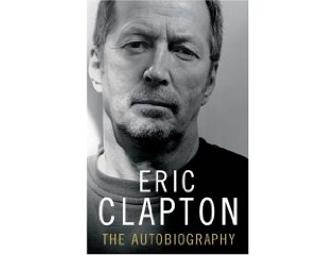Books
Eric Clapton: The Autobiography (Hardcover) by Eric Clapton (Author)
- Item Number
- 987822
- Estimated Value
- 26 USD
- Opening Bid
- 9 USD
Item Description
Eric Clapton: the Autobiography - hardcover - by Eric Clapton
From Publishers Weekly
Readers hoping for sex and drugs and rock 'n' roll won't be disappointed by the legendary guitarist's autobiography. As he retraces every step of his career, from the early stints with the Yardbirds and Cream to his solo successes, Clapton also devotes copious detail to his drug and alcohol addictions, particularly how they intersected with his romantic obsession with Pattie Boyd. His relationship with the woman for whom he wrote Layla culminated in a turbulent marriage he describes as drunken forays into the unknown. But he genuinely warms to the subject of his recovery, stressing its spiritual elements and eagerly discussing the fund-raising efforts for his Crossroads clinic in Antigua. His self-reckoning is filled with modesty, especially in the form of dissatisfaction with his early successes. He professes ambivalence about the famous Clapton is God graffiti, although he admits he was grateful for the recognition from fans. At times, he sounds more like landed gentry than a rock star: bragging about his collection of contemporary art, vigorously defending his hunting and fishing as leisure activities, and extolling the virtues of his quiet country living. But both the youthful excesses and the current calm state are narrated with an engaging tone that nudges Clapton's story ahead of other rock 'n' roll memoirs. (Oct. 9)
Copyright © Reed Business Information, a division of Reed Elsevier Inc. All rights reserved. --This text refers to the Hardcover edition.
From AudioFile
Thats why they call it the blues. Guitar legend Eric Clapton looks back at his life in this self-inflicted account of painful memories. Clapton, a veteran of such legendary bands as the Yardbirds, Cream, Blind Faith, and Derek and the Dominos, is ruthless with himself. He holds nothing back, nor does he ask forgiveness for a life of selfishness and excess. Bill Nighy becomes Clapton in this first-person narrative. With dignity and humility coming through in his performance, Nighy talks about Claptons decades of cheating, philandering, drug use, selfishness, and outright stupidity. But hes so brutally honest and guilty it feels like he is too hard on himself. We have to wonder if a more dispassionate chronicler might have wielded a kinder pen. M.S. © AudioFile 2008, Portland, Maine-- Copyright © AudioFile, Portland, Maine --This text refers to the Audio CD edition.
Review
“One of the very best rock autobiographies ever.”
— Houston Chronicle
“Like the bluesmen who inspired him, Clapton has his share of scars . . . his compelling memoir is . . . a soulful performance.”
—People
“An absorbing tale of artistry, decadence, and redemption.”
—Los Angeles Times
“A glorious rock history.”
—New York Post
“This book does what many rock historians couldn’t: It debunks the legend . . . puts a lie to the glamour of what it means to be a rock star.”
—Greg Kot, Chicago Tribune
“Strong stuff. Clapton reveals its author’s journey to self-acceptance and manhood. Anyone who cares about the man and his music will want to take the trip with him.”
—Anthony DeCurtis, Rolling Stone
“Clapton is honest . . . even searing and often witty, with a hard-won survivor’s humor . . . an honorable badge of a book.”
—Stephen King, New York Times Book Review
“Riveting”
—Boston Herald
“An even, unblinking sensibility defines the author’s voice.”
—New York Times
“An unsparing self-portrait.”
—USA Today
Product Description
“I found a pattern in my behavior that had been repeating itself for years, decades even. Bad choices were my specialty, and if something honest and decent came along, I would shun it or run the other way.”
With striking intimacy and candor, Eric Clapton tells the story of his eventful and inspiring life in this poignant and honest autobiography. More than a rock star, he is an icon, a living embodiment of the history of rock music. Well known for his reserve in a profession marked by self-promotion, flamboyance, and spin, he now chronicles, for the first time, his remarkable personal and professional journeys.
Born illegitimate in 1945 and raised by his grandparents, Eric never knew his father and, until the age of nine, believed his actual mother to be his sister. In his early teens his solace was the guitar, and his incredible talent would make him a cult hero in the clubs of Britain and inspire devoted fans to scrawl “Clapton is God” on the walls of London’s Underground. With the formation of Cream, the world's first supergroup, he became a worldwide superstar, but conflicting personalities tore the band apart within two years. His stints in Blind Faith, in Delaney and Bonnie and Friends, and in Derek and the Dominos were also short-lived but yielded some of the most enduring songs in history, including the classic “Layla.”
During the late sixties he played as a guest with Jimi Hendrix and Bob Dylan, as well as the Beatles, the Rolling Stones, and longtime friend George Harrison. It was while working with the latter that he fell for George’s wife, Pattie Boyd, a seemingly unrequited love that led him to the depths of despair, self-imposed seclusion, and drug addiction. By the early seventies he had overcome his addiction and released the bestselling album 461 Ocean Boulevard, with its massive hit “I Shot the Sheriff.” He followed that with the platinum album Slowhand, which included “Wonderful Tonight,” the touching love song to Pattie, whom he finally married at the end of 1979. A short time later, however, Eric had replaced heroin with alcohol as his preferred vice, following a pattern of behavior that not only was detrimental to his music but contributed to the eventual breakup of his marriage.
In the eighties he would battle and begin his recovery from alcoholism and become a father. But just as his life was coming together, he was struck by a terrible blow: His beloved four-year-old son, Conor, died in a freak accident. At an earlier time Eric might have coped with this tragedy by fleeing into a world of addiction. But now a much stronger man, he took refuge in music, responding with the achingly beautiful “Tears in Heaven.”
Clapton is the powerfully written story of a survivor, a man who has achieved the pinnacle of success despite extraordinary demons. It is one of the most compelling memoirs of our time.
About the Author
ERIC CLAPTON is married to Melia McEnery and is the father of four daughters. He lives outside London.
Excerpt. © Reprinted by permission. All rights reserved.
Growing Up
Early in my childhood, when I was about six or seven, I began to get the feeling that there was something different about me. Maybe it was the way people talked about me as if I weren’t in the room. My family lived at 1, the Green, a tiny house in Ripley, Surrey, which opened directly onto the village Green. It was part of what had once been almshouses and was divided into four rooms; two poky bedrooms upstairs, and a small front room and kitchen downstairs. The toilet was outside, in a corrugated iron shed at the bottom of the garden, and we had no bathtub, just a big zinc basin that hung on the back door. I don’t remember ever using it.
Twice a week my mum used to fill a smaller tin tub with water and sponge me down, and on Sunday afternoons I used to go and have a bath at my Auntie Audrey’s, my dad’s sister, who lived in the new flats on the main road. I lived with Mum and Dad, who slept in the main bedroom overlooking the Green, and my brother, Adrian, who had a room at the back. I slept on a camp bed, sometimes with my parents, sometimes downstairs, depending on who was staying at the time. The house had no electricity, and the gas lamps made a constant hissing sound. It amazes me now to think that whole families lived in these little houses.
My mum had six sisters: Nell, Elsie, Renie, Flossie, Cath, and Phyllis, and two brothers, Joe and Jack. On a Sunday it wasn’t unusual for two or three of these families to show up, and they would pass the gossip and get up–to–date with what was happening with us and with them. In the smallness of this house, conversations were always being carried on in front of me as if I didn’t exist, with whispers exchanged between the sisters. It was a house full of secrets. But bit by bit, by carefully listening to these exchanges, I slowly began to put together a picture of what was going on and to understand that the secrets were usually to do with me. One day I heard one of my aunties ask, “Have you heard from his mum?” and the truth dawned on me, that when Uncle Adrian jokingly called me a little bastard, he was telling the truth.
The full impact of this realization upon me was traumatic, because at the time I was born, in March 1945—in spite of the fact that it had become so common because of the large number of overseas soldiers and airmen passing through England—an enormous stigma was still attached to illegitimacy. Though this was true across the class divide, it was particularly so among working–class families such as ours, who, living in a small village community, knew little of the luxury of privacy. Because of this, I became intensely confused about my position, and alongside my deep feelings of love for my family there existed a suspicion that in a tiny place like Ripley, I might be an embarrassment to them that they always had to explain.
The truth I eventually discovered was that Mum and Dad, Rose and Jack Clapp, were in fact my grandparents, Adrian was my uncle, and Rose’s daughter, Patricia, from an earlier marriage, was my real mother and had given me the name Clapton. In the mid–1920s, Rose Mitchell, as she was then, had met and fallen in love with Reginald Cecil Clapton, known as Rex, the dashing and handsome, Oxford–educated son of an Indian army officer. They had married in February 1927, much against the wishes of his parents, who considered that Rex was marrying beneath him. The wedding took place a few weeks after Rose had given birth to their first child, my uncle Adrian. They set up home in Woking, but sadly, it was a short–lived marriage, as Rex died of consumption in 1932, three years after the birth of their second child, Patricia.
Rose was heartbroken. She returned to Ripley, and it was ten years before she was married again, after a long courtship on his part, to Jack Clapp, a master plasterer. They were married in 1942, and Jack, who as a child had badly injured his leg and therefore been exempt from call–up, found himself stepfather to Adrian and Patricia. In 1944, like many other towns in the south of England, Ripley found itself inundated with troops from the United States and Canada, and at some point Pat, age fifteen, enjoyed a brief affair with Edward Fryer, a Canadian airman stationed nearby. They had met at a dance where he was playing the piano in the band. He turned out to be married, so when she found out she was pregnant, she had to cope on her own. Rose and Jack protected her, and I was born secretly in the upstairs back bedroom of their house on March 30, 1945. As soon as it was practical, when I was in my second year, Pat left Ripley, and my grandparents brought me up as their own child. I was named Eric, but Ric was what they all called me.
Rose was petite with dark hair and sharp, delicate features, with a characteristic pointed nose, “the Mitchell nose,” as it was known in the family and which was inherited from her father, Jack Mitchell. Photographs of her as a young woman show her to have been very pretty, quite the beauty among her sisters. But at some point at the outset of the war, when she had just turned thirty, she underwent surgery for a serious problem with her palate. During the operation there was a power cut that resulted in the surgery having to be abandoned, leaving her with a massive scar underneath her left cheekbone that gave the impression that a piece of her cheek had been hollowed out. This left her with a certain amount of self-consciousness. In his song “Not Dark Yet,” Dylan wrote, “Behind every beautiful face there’s been some kind of pain.” Her suffering made her a very warm person with a deep compassion for other people's dilemmas. She was the focus of my life for much of my upbringing.
Jack, her second husband and the love of her life, was four years younger than Rose. A shy, handsome man, over six feet tall with strong features and very well built, he had a look of Lee Marvin about him and used to smoke his own roll–ups, made from a strong, dark tobacco called Black Beauty. He was authoritarian, as fathers were in those days, but he was kind, and very affectionate to me in his way, especially in my infant years. We didn’t have a very tactile relationship, as all the men in our family found it hard to express feelings of affection or warmth. Perhaps it was considered a sign of weakness. Jack made his living as a master plasterer, working for a local building contractor. He was a master carpenter and a master bricklayer, too, so he could actually build an entire house on his own.
An extremely conscientious man with a very strong work ethic, he brought in a very steady wage, which didn’t ever fluctuate for the whole time I was growing up, so although we could have been considered poor, we rarely had a shortage of money. When things occasionally did get tight, Rose would go out and clean other people’s houses, or work part–time at Stansfield’s, a bottling company with a factory on the outskirts of the village that produced fizzy drinks such as lemonade, orangeade, and cream soda. When I was older I used to do holiday jobs there, sticking on labels and helping with deliveries, to earn pocket money. The factory was like something out of Dickens, reminiscent of a workhouse, with rats running around and a fierce bull terrier that they kept locked up so it wouldn’t attack visitors.
Ripley, which is more like a suburb today, was deep in the country when I was born. It was a typical small rural community, with most of the residents being agricultural workers, and if you weren’t careful about what you said, then everybody knew your business. So it was important to be polite. Guildford was the main shopping town, which you could get to by bus, but Ripley had its own shops, too. There were two butchers, Conisbee’s and Russ’s, and two bakeries, Weller’s and Collins’s, a grocer’s, Jack Richardson’s, Green’s the paper shop, Noakes the ironmonger, a fish–and–chip shop, and five pubs. King and Olliers was the haberdashers where I got my first pair of long trousers, and it doubled as a post office, and we had a blacksmith where all the local farm horses came in for shoes.
Every village had a sweet shop; ours was run by two old-fashioned sisters, the Miss Farrs. We would go in there and the bell would go ding–a–ling–a–ling, and one of them would take so long to come out from the back of the shop that we could fill our pockets up before a movement of the curtain told us she was about to appear. I would buy two Sherbert Dabs or a few Flying Saucers, using the family ration book, and walk out with a pocketful of Horlicks or Ovaltine tablets, which had become my first addiction.
In spite of the fact that Ripley was, all in all, a happy place to grow up in, life was soured by what I had found out about my origins. The result was that I began to withdraw into myself. There seemed to have been some definite choices made within my family regarding how to deal with my circumstances, and I was not made privy to any of them. I observed the code of secrecy that existed in the house—“We don’t talk about what went on”—and there was also a strong disciplinarian authority in the household, which made me nervous about asking any questions. On reflection, it occurs to me that the family had no real idea of how to explain my own existence to me, and that the guilt attached to that made them very aware of their own shortcomings, which would go a long way in explaining the anger and awkwardness that my presence aroused in almost everybody. As a result I attached myself to the family dog, a black Labrador called Prince, and created a character for myself, whose name was “Johnny Malingo.” Johnny was a suave, devil–may–care man/boy of the world who rode roughshod over anyone who got in his way. I would escape into Johnny when things got too much...
- Hardcover: 384 pages
- Publisher: Century (October 9, 2007)
- ISBN-10: 1846051606
- ISBN-13: 978-1846051609
- Product Dimensions: 9.4 x 6.2 x 1.6 inches
Item Special Note
Winner needs to pick up the book by December 14th at the Foundation Office located in Building 600 on campus.
Donated By:
Solano Community College Foundation stores data...
Your support matters, so Solano Community College Foundation would like to use your information to keep in touch about things that may matter to you. If you choose to hear from Solano Community College Foundation, we may contact you in the future about our ongoing efforts.
Your privacy is important to us, so Solano Community College Foundation will keep your personal data secure and Solano Community College Foundation will not use it for marketing communications which you have not agreed to receive. At any time, you may withdraw consent by emailing Privacy@frontstream.com or by contacting our Privacy Officer. Please see our Privacy Policy found here PrivacyPolicy.










